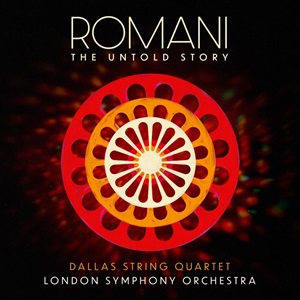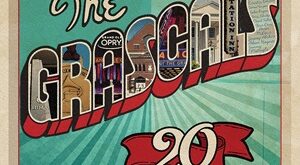I’m familiar with the Dallas String Quartet’s often dazzling ability to mingle original musical compositions with a vigorous reimagining of well-known pop classics. Their stunning re-invention of The Beatles’ “Eleanor Rigby” from the Quartet’s first release is a perfect example. However, I believe the unit’s new release, ROMANI: The Untold Story, thrusts founder Ion Zanca and his bandmates into unchartered territory. Their artistry throughout this five-song EP establishes them as far more than an uniquely inventive musical outfit with one foot in classical and another in modern pop. Instead, it solidifies their position as one of contemporary music’s most prodigiously brilliant acts.
URL: https://www.dallasstringquartet.com/
It doesn’t shirk an inch from dealing with weighty matters. A visit to the former Dachau Concentration Camp and an encounter with its Romani memorial moved Zanca, born of Romani ancestry, to envision this release as a tribute and memorial to the life-affirming spirit and battered but unbowed endurance of the Romani in the face of abominations. “Brewing Conflict”, the first track, is an undeniably physical performance that I think anyone who thinks classical music is “boring” should hear. The lyricism, virtuoso skill, and ceaseless imagination of the piece are equally affecting.
“Letters of Pain” goes in a different direction while retaining the identity established by the EP opener. Anguish is rife throughout this piece. The Dallas String Quartet does not express such emotions through crass histrionics, but instead conveys the grieving spirit of suffering people through heartfelt melodies. I find this to be one of the EP’s best moments. The musicians develop abundant dynamics incrementally; the compositional instincts of this release are to never show its cards at once. Instead, the Dallas String Quartet draws us into its web with immense skill. I believe you will finish this performance as breathless as I was after first hearing the cut.
“Key to Heaven” is one of the EP’s zeniths. Dallas String Quartet layers immense nuance throughout the piece, and the track’s second half is especially outstanding. It is as if it is a final release from the horrors the Romani survive. The sensitivity of the violin playing during the song’s coda weaves perhaps the EP’s most memorable moment. “Sangre Gitana” is its equal. Many will find it even greater.
I didn’t expect to hear guitar. Pairing the six-string with Dallas String Quartet’s classical foundation isn’t a groundbreaking move, but it caught me off guard. It doesn’t dominate the performance. Zanca and his performing partners keep a great balance between the various musical elements, never leaning too far in a particular direction, and it gives the track remarkable cohesion. The final curtain of “Rhapsody for the Romani” moves between raw emotion and intense displays of musical skill – but it is never emptily cerebral. The Dallas String Quartet’s approach to classical music is notable for scores of reasons. Their talent for delivering classical music in a way that’s accessible to any listener is perhaps most notable. It serves them well with such a dark subject, but I applaud them for shining an irrepressible light through the darkness.
Mark Druery
 IndieShark Music News, Reviews & Interviews
IndieShark Music News, Reviews & Interviews



